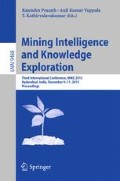Abstract
Link prediction has become a common way to infer new associations among actors in social networks. Most existing methods focus on the local and global information neglecting the implication of the actors in social groups. Further, the prediction process is characterized by a high complexity and uncertainty. In order to address these problems, we firstly introduce a new evidential weighted version of the social networks graph-based model that encapsulates the uncertainty at the edges level using the belief function framework. Secondly, we use this graph-based model to provide a novel approach for link prediction that takes into consideration both groups information and uncertainty in social networks. The performance of the method is experimented on a real world social network with group information and shows interesting results.
Access this chapter
Tax calculation will be finalised at checkout
Purchases are for personal use only
References
Adamic, L.A., Adar, E.: Friends and neighbors on the web. Soc. Netw. 25(3), 211–230 (2003)
Adar, E., Ré, C.: Managing uncertainty in social networks. Data Eng. Bull. 30(2), 23–31 (2007)
Ben Dhaou, S., Kharoune, M., Martin, A., Ben Yaghlane, B.: Belief Approach for Social Networks. In: Cuzzolin, F. (ed.) BELIEF 2014. LNCS, vol. 8764, pp. 115–123. Springer, Heidelberg (2014)
Dempster, A.P.: Upper and lower probabilities induced by a multivalued mapping. Ann. Math. Stat. 38, 325–339 (1967)
Jaccard, P.: Étude comparative de la distribution florale dans une portion des Alpes et des Jura. Bull. Soc. Vaudoise Sci. Nat. 37, 547–579 (1901)
Johansson, F., Svenson, P.: Constructing and analyzing uncertain social networks from unstructured textual data. In: Özyer, T., Erdem, Z., Rokne, J., Khoury, S. (eds.) Mining Social Networks and Security Informatics. Lecture Notes in Social Networks, pp. 41–61. Springer, Netherlands (2014)
Kossinets, G.: Effects of missing data in social networks. Soc. Netw. 28, 247–268 (2003)
Liben-Nowell, D., Kleinberg, J.: The link-prediction problem for social networks. J. Am. Soc. Inf. Sci. Technol. 58(7), 1019–1031 (2007)
McAuley, J.J., Leskovec, J.: Learning to discover social circles in ego networks. In: NIPS, pp. 548–556 (2012)
Newman, M.E.J.: Clustering and preferential attachment in growing networks. Phys. Rev. E 65, 025102 (2001)
Shafer, G.: A Mathematical Theory of Evidence. Princeton University Press, Princeton (1976)
Smets, P.: The transferable belief model for quantified belief representation. In: Smets, P. (ed.) Handbook of Defeasible Reasoning and Uncertainty Management Systems., pp. 267–301. Springer, Netherlands (1988)
Smets, P.: The canonical decomposition of a weighted belief. In: Proceedings of the Fourteenth International Joint Conference on Artificial Intelligence, IJCAI 1995, vol. 14, pp. 1896–1901 (1995)
Smets, P.: Application of the transferable belief model to diagnostic problems. Int. J. Intell. Syst. 13(2–3), 127–157 (1998)
Smets, P., Kennes, R.: The transferable belief model. Artif. Intell. 66(2), 191–234 (1994)
Soundarajan, S., Hopcroft, J.: Using community information to improve the precision of link prediction methods. In: Proceedings of the 21st International Conference Companion on World Wide Web, pp. 607–608. ACM (2012)
Valverde-Rebaza, J., de Andrade Lopes, A.: Exploiting behaviors of communities of twitter users for link prediction. Soc. Netw. Anal. Min. 3(4), 1063–1074 (2013)
Valverde-Rebaza, J.C., de Andrade Lopes, A.: Link prediction in complex networks based on cluster information. In: Barros, L.N., Finger, M., Pozo, A.T., Gimenénez-Lugo, G.A., Castilho, M. (eds.) SBIA 2012. LNCS, vol. 7589, pp. 92–101. Springer, Heidelberg (2012)
Valverde-Rebaza, J.C., de Andrade Lopes, A.: Link Prediction in Online Social Networks Using Group Information. In: Murgante, B., Misra, S., Rocha, A.M.A.C., Torre, C., Rocha, J.G., Falcão, M.I., Taniar, D., Apduhan, B.O., Gervasi, O. (eds.) ICCSA 2014, Part VI. LNCS, vol. 8584, pp. 31–45. Springer, Heidelberg (2014)
Zhang, Q.M., Lü, L., Wang, W.Q., Zhu, Y.X., Zhou, T.: Potential theory for directed networks. PLoS ONE 8(2), e55437 (2013)
Author information
Authors and Affiliations
Corresponding author
Editor information
Editors and Affiliations
Rights and permissions
Copyright information
© 2015 Springer International Publishing Switzerland
About this paper
Cite this paper
Mallek, S., Boukhris, I., Elouedi, Z., Lefevre, E. (2015). Evidential Link Prediction Based on Group Information. In: Prasath, R., Vuppala, A., Kathirvalavakumar, T. (eds) Mining Intelligence and Knowledge Exploration. MIKE 2015. Lecture Notes in Computer Science(), vol 9468. Springer, Cham. https://doi.org/10.1007/978-3-319-26832-3_45
Download citation
DOI: https://doi.org/10.1007/978-3-319-26832-3_45
Published:
Publisher Name: Springer, Cham
Print ISBN: 978-3-319-26831-6
Online ISBN: 978-3-319-26832-3
eBook Packages: Computer ScienceComputer Science (R0)

